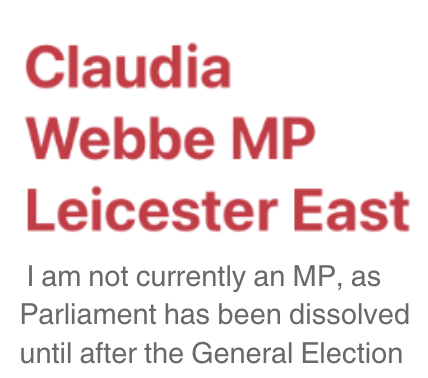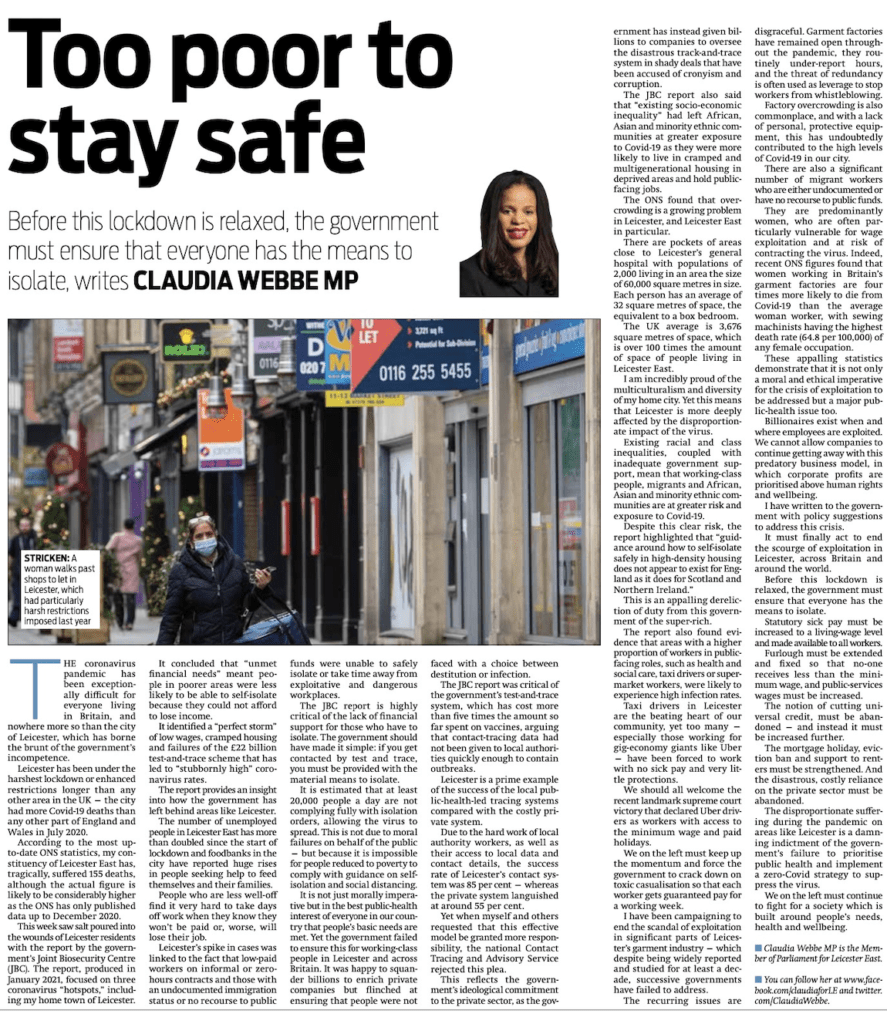Too poor to stay safe
By Claudia Webbe MP
Before this lockdown is relaxed, the government must ensure that everyone has the means to isolate, writes CLAUDIA WEBBE MP
THE coronavirus pandemic has been exceptionally difficult for everyone living in Britain, and nowhere more so than the city of Leicester, which has borne the brunt of the government’s incompetence.
Leicester has been under the harshest lockdown or enhanced restrictions longer than any other area in the UK — the city had more Covid-19 deaths than any other part of England and Wales in July 2020.
According to the most up-to-date ONS statistics, my constituency of Leicester East has, tragically, suffered 155 deaths, although the actual figure is likely to be considerably higher as the ONS has only published data up to December 2020.
This week saw salt poured into the wounds of Leicester residents with the report by the government’s Joint Biosecurity Centre (JBC). The report, produced in January 2021, focused on three coronavirus “hotspots,” including my home town of Leicester.
It concluded that “unmet financial needs” meant people in poorer areas were less likely to be able to self-isolate because they could not afford to lose income.
It identified a “perfect storm” of low wages, cramped housing and failures of the £22 billion test-and-trace scheme that has led to “stubbornly high” coronavirus rates.
The report provides an insight into how the government has left behind areas like Leicester.
The number of unemployed people in Leicester East has more than doubled since the start of lockdown and foodbanks in the city have reported huge rises in people seeking help to feed themselves and their families.
People who are less well-off find it very hard to take days off work when they know they won’t be paid or, worse, will lose their job.
Leicester’s spike in cases was linked to the fact that low-paid workers on informal or zero-hours contracts and those with an undocumented immigration status or no recourse to public funds were unable to safely isolate or take time away from exploitative and dangerous workplaces.
The JBC report is highly critical of the lack of financial support for those who have to isolate. The government should have made it simple: if you get contacted by test and trace, you must be provided with the material means to isolate.
It is estimated that at least 20,000 people a day are not complying fully with isolation orders, allowing the virus to spread. This is not due to moral failures on behalf of the public — but because it is impossible for people reduced to poverty to comply with guidance on self-isolation and social distancing.
It is not just morally imperative but in the best public-health interest of everyone in our country that people’s basic needs are met. Yet the government failed to ensure this for working-class people in Leicester and across Britain. It was happy to squander billions to enrich private companies but flinched at ensuring that people were not faced with a choice between destitution or infection.
The JBC report was critical of the government’s test-and-trace system, which has cost more than five times the amount so far spent on vaccines, arguing that contact-tracing data had not been given to local authorities quickly enough to contain outbreaks.
Leicester is a prime example of the success of the local public-health-led tracing systems compared with the costly private system.
Due to the hard work of local authority workers, as well as their access to local data and contact details, the success rate of Leicester’s contact system was 85 per cent — whereas the private system languished at around 55 per cent.
Yet when myself and others requested that this effective model be granted more responsibility, the national Contact Tracing and Advisory Service rejected this plea.
This reflects the government’s ideological commitment to the private sector, as the government has instead given billions to companies to oversee the disastrous track-and-trace system in shady deals that have been accused of cronyism and corruption.
The JBC report also said that “existing socio-economic inequality” had left African, Asian and minority ethnic communities at greater exposure to Covid-19 as they were more likely to live in cramped and multigenerational housing in deprived areas and hold public-facing jobs.
The ONS found that overcrowding is a growing problem in Leicester, and Leicester East in particular.
There are pockets of areas close to Leicester’s general hospital with populations of 2,000 living in an area the size of 60,000 square metres in size. Each person has an average of 32 square metres of space, the equivalent to a box bedroom.
The UK average is 3,676 square metres of space, which is over 100 times the amount of space of people living in Leicester East.
I am incredibly proud of the multiculturalism and diversity of my home city. Yet this means that Leicester is more deeply affected by the disproportionate impact of the virus.
Existing racial and class inequalities, coupled with inadequate government support, mean that working-class people, migrants and African, Asian and minority ethnic communities are at greater risk and exposure to Covid-19.
Despite this clear risk, the report highlighted that “guidance around how to self-isolate safely in high-density housing does not appear to exist for England as it does for Scotland and Northern Ireland.”
This is an appalling dereliction of duty from this government of the super-rich.
The report also found evidence that areas with a higher proportion of workers in public-facing roles, such as health and social care, taxi drivers or supermarket workers, were likely to experience high infection rates.
Taxi drivers in Leicester are the beating heart of our community, yet too many — especially those working for gig-economy giants like Uber — have been forced to work with no sick pay and very little protections.
We should all welcome the recent landmark supreme court victory that declared Uber drivers as workers with access to the minimum wage and paid holidays.
We on the left must keep up the momentum and force the government to crack down on toxic casualisation so that each worker gets guaranteed pay for a working week.
I have been campaigning to end the scandal of exploitation in significant parts of Leicester’s garment industry — which despite being widely reported and studied for at least a decade, successive governments have failed to address.
The recurring issues are disgraceful. Garment factories have remained open throughout the pandemic, they routinely under-report hours, and the threat of redundancy is often used as leverage to stop workers from whistleblowing.
Factory overcrowding is also commonplace, and with a lack of personal, protective equipment, this has undoubtedly contributed to the high levels of Covid-19 in our city.
There are also a significant number of migrant workers who are either undocumented or have no recourse to public funds.
They are predominantly women, who are often particularly vulnerable for wage exploitation and at risk of contracting the virus. Indeed, recent ONS figures found that women working in Britain’s garment factories are four times more likely to die from Covid-19 than the average woman worker, with sewing machinists having the highest death rate (64.8 per 100,000) of any female occupation.
These appalling statistics demonstrate that it is not only a moral and ethical imperative for the crisis of exploitation to be addressed but a major public-health issue too.
Billionaires exist when and where employees are exploited. We cannot allow companies to continue getting away with this predatory business model, in which corporate profits are prioritised above human rights and wellbeing.
I have written to the government with policy suggestions to address this crisis.
It must finally act to end the scourge of exploitation in Leicester, across Britain and around the world.
Before this lockdown is relaxed, the government must ensure that everyone has the means to isolate.
Statutory sick pay must be increased to a living-wage level and made available to all workers.
Furlough must be extended and fixed so that no-one receives less than the minimum wage, and public-services wages must be increased.
The notion of cutting universal credit, must be abandoned — and instead it must be increased further.
The mortgage holiday, eviction ban and support to renters must be strengthened. And the disastrous, costly reliance on the private sector must be abandoned.
The disproportionate suffering during the pandemic on areas like Leicester is a damning indictment of the government’s failure to prioritise public health and implement a zero-Covid strategy to suppress the virus.
We on the left must continue to fight for a society which is built around people’s needs, health and wellbeing.
Claudia Webbe MP is the member of Parliament for Leicester East. You can follow her at www.facebook.com/claudiaforLE and twitter.com/ClaudiaWebbe



